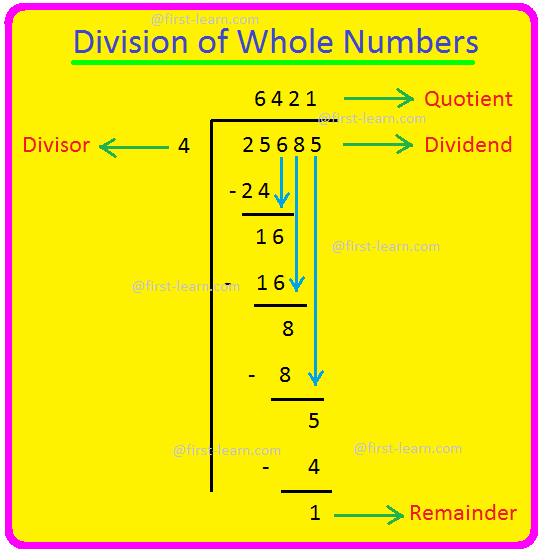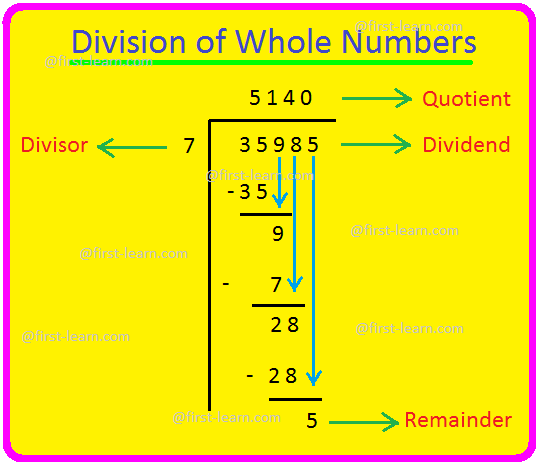Division of Whole Numbers
Whole numbers are sometimes termed as counting numbers or are more similar to natural numbers. But there is a hairline difference between all these and whole number. Whole number includes a set of natural numbers along with zero. However, natural and counting numbers does not include zero. Therefore whole numbers are 0, 1, 2, 3, 4, 5, 6, 7, 8, 9, 10 ………etc.
There are four basic operations with whole numbers that is addition, subtraction, multiplication and division. This subtopic will deal with division of whole numbers.
As we know multiplication is repeated addition in a similar way division is repeated subtraction.
For example: 60 ÷ 6 = 10
60 divided by 6 means we will subtract 10 times 6 from 60.
i. 60 – 6 = 54
ii. 54 – 6 = 48
iii. 48 – 6 = 42
iv. 42 – 6 = 36
v. 36 – 6 = 30
vi. 30 – 6 =24
vii. 24 -6 = 18
viii. 18 -6 = 12
ix. 12 – 6 = 6
x. 6 -6 = 0
Another more fact about division is that as subtraction is the inverse of addition in a similar way division is the inverse of multiplication.
For example: 120 ÷ 10 = 12
Again, 12 × 10 = 120
Or, 120 ÷ 12 = 10
Therefore from this example it is clear that division is the inverse of multiplication.
In division there are few components that are dividend, divisor, quotient and remainder. There is a relationship between these four components.
Dividend = Divisor × Quotient + Remainder
Example: 25685 ÷ 4
Here 25, 685 is the dividend, 4 is the divisor. 2 is less than 4 hence we have to consider two numbers that is 25. When 4 multiplied with 6 it is 24 so the remainder is 1 and in the next step 6 came down and became 16. Now 4 multiplied by 4 is 16. Then we will have to bring down 5 and 4 is multiplied with 1 to get 4 so the remainder 1.
For checking:
Dividend = Divisor × quotient + remainder
= 4 × 6421 + 1
= 25684 +1
= 25685 (Dividend)
Example: 35985 ÷ 7
Here 35985 is the dividend, 7 is the divisor. First we will consider 3 from the dividend but as 3 is less than 7 therefore we will have to consider 35. Now 7 multiplied by 5 is 35 and there is no remainder. Then 9 is brought down. 7 multiplied by 1 is 7 and remainder is 2. Then with this 2 we will bring down 8 which makes it 28. Now 7 multiplied by 4 is 28. Lastly 5 is brought down but 5 is less that 7 so we have to do 7 multiplied by 0 which is 0 only and hence 5 is the remainder.
For checking:
Dividend = Divisor × quotient + remainder
= 7 × 5140 + 5
= 35, 980 +5
= 35, 985 (Dividend)
From Division of Whole Numbers to HOME PAGE
Recent Articles
-
Plants Around Us | Big & Small Plants | Shrubs & Herbs | Water Plants
Feb 03, 26 02:01 AM
We see different types of plants around us. Plants are living things. They breathe and grow. They also reproduce. Most of the plants grow on land. Some plants grow in water. -
Formed Elements of Blood | Erythrocytes | ESR |Leukocytes |Neutrophils
Jan 15, 26 01:25 AM
Formed elements formed elements are constitute about 45 % of blood afeias haematocrit value packed cell volume mostly of red blood corpuscles and are of 3 types- erythrocytes, leukocytes and blood pla… -
What Is Plasma? | Blood Plasma | Proteins | Nutrients | Cholesterol
Nov 07, 25 10:29 AM
Blood is a mobile fluid which is a connective tissue and is derived from the mesoderm like cell any other connective tissue. Colour of blood is reddish and that flows inside the blood vessels by means… -
Disorders of Respiratory System | Tuberculosis | Pleurisy | Emphysema
Oct 28, 25 11:39 PM
Tuberculosis is very common disease and is caused by a type of bacteria called Mycobacterium tuberculosis. This disease causes different trouble in the respiration and infection of several parts of th… -
Regulation of Respiration | Respiratory Centres | Inspiratory Area |
Oct 14, 25 12:13 AM
Respiratory Centre is the area that controls the rate of respiration and it is observed to be located in medulla oblongata and pons. Respiratory Centre has the following will dispersed components like…







New! Comments
Have your say about what you just read! Leave me a comment in the box below.